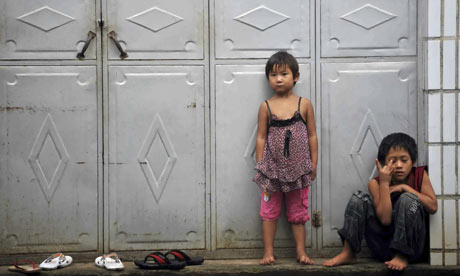
Thousands of people have fled from northern Burma into China after fighting erupted between government troops and an armed ethnic group yesterday, breaking a 20-year ceasefire.
Witnesses in the Chinese border town of Nansan, in southern Yunnan province, reported hearing further gunfire today. Officials said about 10,000 refugees had arrived from Kokang, a mostly ethnically Chinese region where many Chinese nationals also do business, in the last few days.
A news website run by the Yunnan authorities said fighting "led residents from the Myanmar [Burma] side to panic and flood in large numbers into our territory". Many more arrived before the outbreak of fighting, as government troops moved into Kokang, part of the Shan state, which covers about a quarter of Burma. The exile-run Shan Herald Agency for News said Kokang's capital, Laogai, had been under Burmese government control since Monday night.
Analysts warned that the fighting could spread.
The government signed a ceasefire with ethnic groups in the Shan state in 1989, allowing them to hold on to their arms. Several fused their political aims with vast drug operations and have grown increasingly powerful, enjoying considerable autonomy. But the Burmese army has gradually increased its presence and the State Peace and Development Council (SPDC), the official name of the ruling military junta, recently began pressing the militias to be incorporated into an official border force.
Tensions spilled over on 8 August when the army tried to raid the home of Kokang leader Peng Jiashen, also known as Phon Kyar Shin, saying they were looking for drugs. Government soldiers and a breakaway Kokang faction forced Peng's troops out of Laogai this week.
"Many people have crossed the border since 8 August. Yesterday there were a lot more because the war [sic] started and I heard some fences even got pushed over by people trying to get in. Today there are not so many," a local businessman said. "If you go near the border you can hear machine guns."
A worker with an international medical charity, who asked not to be named, told Associated Press that local authorities were caring for about 4,000 refugees and several thousand more were staying in hotels or with relatives.
The Chinese government has toughened security along the normally porous border, the Global Times reported. "These special regions have become a timebomb for Myanmar [Burma]," He Shengda, an expert on the region at the Yunnan Academy of Social Sciences, told the Chinese newspaper. "These local militia won't meekly abandon power, and a region that was peaceful may experience turmoil."
The junta that rules Burma has been anxious to ensure stability before national elections next year – the first since 1990 polls that were won by the opposition but not honoured by the junta.
Some analysts argue the push against the Kokang could backfire. "It could spread to a lot of groups around the area … People don't realise how heavily militarised this zone is," said David Mathieson of Human Rights Watch.
He added: "For the Kokang and Wa and other groups, [the ceasefires] were a respite to make money, develop their areas and eventually gain a level of autonomy in the political reforms the SPDC [then called the State Law and Order Restoration Council or SLORC] promised.
"From the SPDC side, they wanted a respite to consolidate urban areas after the 1988 uprising. They thought these groups would be weakened and eventually would come back into the legal fold and surrender their weapons."
Both sides had become frustrated in recent years, he suggested.
Mathieson said China was likely to put pressure on both the Burmese government and the Kokang to ensure the border was "completely stable" to safeguard energy supplies and for the sake of Chinese businesses.
The Irrawaddy, an exile-run website, reported that the Mong La group and the powerful United Wa State Army had joined the Kokang in a counter-offensive yesterday.
It quoted Aung Kyaw Zaw, an analyst based on the Sino-Burmese border, as saying that Peng Jiasheng had fled to a Wa base and released a statement urging the Burmese regime to withdraw troops and seek a peaceful solution. Burmese authorities had issued an arrest warrant for Peng and his supporters and appointed defectors from his ranks as the new Kokang leaders, it added.
"Although problematic in many ways, the ceasefires agreed between the Burmese military government and most - but not all - armed ethnic groups since 1989 have led to a reduction in the most serious forms of human rights abuse, and have created some space for the re-emergence of civil society networks," said Ashley South, author of Ethnic Politics in Burma: States of Conflict.
"[But] the ceasefires have not addressed the underlying causes of ethnic conflict in Burma. Until there is a political settlement, the 'ethnic issue' will remain – together with the lack of democracy – one of the two fundamental political conflicts in Burma."
0 comments:
Post a Comment